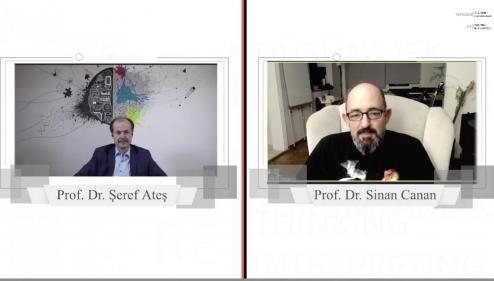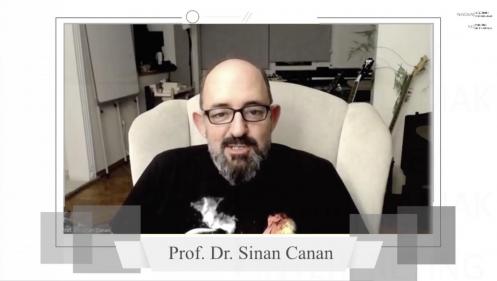Sinan Canan hosted at 'Rethinking, Reinterpreting'
Yunus Emre Institute President Prof. Dr. Şeref Ateş hosted Prof. Dr. Sinan Canan, who wrote many books on brain, consciousness and reality and perception and was active both in popular media and scientific field, at his program "Rethinking, Reinterpreting," aired on the social media accounts of Yunus Emre Institute with the participation of distinguished figures every week.
Our Institute President Prof. Dr. Şeref Ateş made the opening speech of the program. "When we first launched this program, we were hesitant about how well it would be received by the viewers. Seeing that the previous programs have been watched by hundreds of thousands of people, we have become more hopeful. Indeed, people from different parts of the world see it as an opportunity for rethinking and they seek to get rid of the fetters of the automatic pilot, i.e., their subconscious, in which they have confided, to start rethinking," he said.
Prof. Dr. Şeref Ateş's first question was: "The digital media, cellphones, remote interaction, and communication have become out daily routines. Do you think there are certain points which we should pay attention to particularly as regards addiction? What is your advice for young people and middle aged people?" Sinan Canan answered the question as follows:
"The recent developments have made us unable to do many things we would normally do and urged us to do many things we wouldn't possibly do in our routines. We are going through such an interesting passage of time. We are particularly inclined to do things which the majority of people do. We feel ourselves comfortable with our herd mentality. This is because we become marginal when we go beyond the boundaries and if something goes wrong, you may get all the blame. So we tend to abide by the conventions and do what other people do. The most interesting thing with this coronavirus crisis is that it has made no distinction among people. Everyone is in the same situation; everyone is defeated; we can do nothing. Therefore, such venues have become our compulsory routes. Now, certain new normals have emerged. Now, everyone is talking about what will come out of the new normal or what people will do. Everyone is trying to find out this, but we should not be worried much. No one can know the outcome since this is a chaotic situation. So we will wait and see."
Our Institute President Prof. Dr. Şeref Ateş's next question was: "Our genetic codes are determined by our parents. Yet, with this coronavirus crisis, something different has happened: a new trauma, and the whole world has found itself in a new situation. With the pandemic, we have now the possibility of getting rid of the automatic pilot. We are able to change ourselves only in the face of a trauma or when we have an extraordinary inspiration or when we fall in love or when we are faced with a special situation. In this context, you frequently refer in your talks to a term: factory defaults. What are the factory defaults of man?" Sinan Canan's answer was as follows:
"Why am I like this? What are other people like that? Why am I not like that? Why doesn't he act like me? I had to think about why people are like this or what are differences among us as well as what commonalities we have. As a professional biologist, I had the opportunity to adopt a biological perspective, and I have realized that human beings are extremely extraordinary creatures. I mean, our bodies are virtually the same with other living beings. Our liver is not very different from that of an animal. There are small differences between a plant cell and a human cell. The cellular fluid, the nucleic acids in the nucleus, everything are the same. Man is the only creature that creates problems when he eats his fill. This is exactly the case with us. When we satisfy the needs of our bodies, we find ourselves in a worse dissatisfaction. We have to look for a meaning and push beyond the limits. When we examine everything written about human beings, transferred to us through traditions, through arts or biological research or psychological tests, we see that they tell us something: Human beings feel disturbed particularly in the modern era. Why are they uneasy? Although they lead a wealthy life within the civilization they have created, they experience incompatibility with this civilization. They are gaining speed, but they can get no satisfaction despite the speed. In spite of these developments, they cannot feel the satisfaction. They are earning good, but they cannot content themselves with it. We see such weird cases. We have been being governed with five or six simple rules for the last 20 or 30 years and exhibit extremely complex behaviors. What I refer to as factory defaults of human beings has emerged as a theory. And that theory seeks to come up with the common characteristics of human beings such as 'People mostly have hands and there are five fingers at their hands'. It has five items and the very essence of these items is this: Given that human beings have been around for 300,000 years, the ancestors of human beings who lived 200.000-300.000 years ago had been programmed to survive with naked bodies in special natural conditions. With their constitution and equipment, human beings had naked bodies. Against the frailty of their bodies, they had tremendous mental powers and thanks to their mental powers, they could change their environment and create living spheres for themselves. Therefore, we can say that we are a species who can survive solely with their brain or mental skills. In other words, we can say that there is not much physical difference between our ancestors who lived 200.000-300.000 years ago, and they wouldn't be much mental difference as well. With this perspective, let us imagine how people were living 200.000 years ago and look at the way we live today. In other words, the technology we have developed, the industry, and the civilization surrounding us have nothing to do with the environment where our ancestors were living. This body is equipped with a survival manager in order to adapt to the impossible. Therefore, I have tried to come up with a definition which we may refer to as the inherent settings of man, and limited it to five items. If the list is extended, there will be many errors. Thus, we are programmed to move. We are programmed to eat less. We are programmed to establish good relations with other people. You have to manage your stress. We have to push beyond our limits. We feel comfortable as we push against psychological, biological, physical, and other limits. We become happy as we push ourselves. We feel good as we become successful. We are such weird creatures."
You can watch the program from the following links.
https://www.pscp.tv/w/1DXxyejgyenxM (Turkish)
https://www.pscp.tv/w/1ynKOpyLpXXGR (English)
https://www.facebook.com/yeearabic/videos/276153116841842/ (Arabic)






